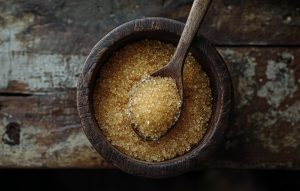Written by Chrystal Moulton, Science Writer. The effect of monk fruit extract on glucose metabolism showed a significant decrease in the AUC of insulin (18% decrease, P <0.05) and glucose (22% decrease, P <0.05) in two clinical trials.
 Monk fruit is a botanical sweetener that provides intense sweetness without affecting glycemic index1. Monk fruit also contains bioactive components that acts as both anti-inflammatory and antioxidant1. Although monk fruit is marketed both in North America and China, Research on its effect on the lipid regulation, glucose metabolism, any information is limited2,3. In the current study, researchers conducted a systematic review of existing research evaluating the effects of monk fruit extract in humans4.
Monk fruit is a botanical sweetener that provides intense sweetness without affecting glycemic index1. Monk fruit also contains bioactive components that acts as both anti-inflammatory and antioxidant1. Although monk fruit is marketed both in North America and China, Research on its effect on the lipid regulation, glucose metabolism, any information is limited2,3. In the current study, researchers conducted a systematic review of existing research evaluating the effects of monk fruit extract in humans4.
Researchers conducted a systematic review of research of in four electronic databases: Web of Science, Scopus, the Cochrane Library, and PubMed. Researchers limited their search of existing research to publications within the last decade that were clinical trials involving human subjects assigned monk fruit extract as an intervention. After removing duplicates, researchers applied tools to evaluate methodological quality of the randomized clinical trials used in this evaluation. These tools included the Cochrane Risk of Bias 2.0 and the Jadad scale. High scores on the Jadad scale indicated good quality methodology.
A total of 40 clinical trials underwent initial screening for methodological quality. Of these, 5 studies were included in this analysis. These five studies were further characterized into two groups: glucose metabolism and symptom relief. Sample sizes between these studies ranged from 30 to 203 participants per trial. Furthermore, duration of the studies ranged from seven days to six months and monk fruit extract dose ranged from 250 to 300mg/ day. Research representing the effect of monk fruit extract on glucose metabolism showed a significant decrease in the AUC of insulin (18% decrease, P <0.05) and glucose (22% decrease, P <0.05) in two clinical trials3,5 as well as a 6% decrease in fasting blood glucose (P = 0.04) in healthy adults6. Research on the effects of monk fruit extract on symptom relief and antioxidant properties demonstrated that in two clinical trials patients given monk fruit extract experienced a significant reduction in throat pain and discomfort post-intubation7 . Furthermore, patients with pharyngitis experience similar reduction in symptoms (P <0.01) and congestion (P <0.05)6. The Cochrane risk of bias for all 5 studies was generally low with only one study related to symptom relief showing moderate bias. All 5 studies demonstrated high quality methodology based on Jadad score.
Overall, this systematic review demonstrated high quality trials supporting the use of monk fruit extract for glucose management and symptom relief associated with throat discomfort. At present, monk fruit extract is marketed in North America and China. However, it is not marketed in the European Union. Additional studies are needed to strengthen its use case in the European Union while building evidence for its effectiveness as an antioxidant and possibly a tool for glucose management.
Source: Kaim, Urszula, and Karolina Labus. “Monk Fruit Extract and Sustainable Health: A PRISMA-Guided Systematic Review of Randomized Controlled Trials.” Nutrients 17, no. 9 (2025): 1433.
© 2025 by the authors. Licensee MDPI, Basel, Switzerland. This article is an open access article distributed under the terms and conditions of the Creative Commons Attribution (CC BY) license (https://creativecommons.org/license
s/by/4.0/).
Click here to read the full text study.
Posted July 2, 2025.
Chrystal Moulton BA, PMP, is a 2008 graduate of the University of Illinois at Chicago. She graduated with a bachelor’s in psychology with a focus on premedical studies and is a licensed project manager. She currently resides in Indianapolis, IN.
References:
- Muñoz-Labrador A, Hernandez-Hernandez O, Moreno FJ. A review of the state of sweeteners science: the natural versus artificial non-caloric sweeteners debate. Stevia rebaudiana and Siraitia grosvenorii into the spotlight. Crit Rev Biotechnol. Sep 2024;44(6):1080-1102. doi:10.1080/07388551.2023.2254929
- Sievenpiper JL, Purkayastha S, Grotz VL, et al. Dietary Guidance, Sensory, Health and Safety Considerations When Choosing Low and No-Calorie Sweeteners. Nutrients. Feb 25 2025;17(5)doi:10.3390/nu17050793
- Tey S, Salleh N, Henry J, Forde C. Effects of aspartame-, monk fruit-, stevia-and sucrose-sweetened beverages on postprandial glucose, insulin and energy intake. International Journal of Obesity. 2017;41(3):450.
- Kaim U, Labus K. Monk Fruit Extract and Sustainable Health: A PRISMA-Guided Systematic Review of Randomized Controlled Trials. Nutrients. Apr 24 2025;17(9)doi:10.3390/nu17091433
- Tey SL, Salleh NB, Henry CJ, Forde CG. Effects of non-nutritive (artificial vs natural) sweeteners on 24-h glucose profiles. Eur J Clin Nutr. Sep 2017;71(9):1129-1132. doi:10.1038/ejcn.2017.37
- Wu Y, Zhang F, Kuang D, et al. Efficacy of botanical lozenges in the treatment of chronic pharyngitis: a randomized controlled trial. Front Pharmacol. 2024;15:1162883. doi:10.3389/fphar.2024.1162883
- Tan HL, Liang YK, Li YM, et al. Effects of Luo Han Guo on throat complications associated with tracheal intubation: a randomized controlled trial. The Journal of international medical research. Jul 2019;47(7):3203-3211. doi:10.1177/0300060519853656







Comments (0)